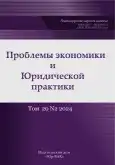Развитие «науки самосовершенствования» в интернете сквозь призму экономической безопасности личности
- Авторы: Булгакова М.А.1
-
Учреждения:
- Академия управления МВД России
- Выпуск: Том 20, № 2 (2024)
- Страницы: 216-221
- Раздел: Региональная и отраслевая экономика
- URL: https://journal-vniispk.ru/2541-8025/article/view/260151
- DOI: https://doi.org/10.33693/2541-8025-2024-20-2-216-221
- EDN: https://elibrary.ru/PEHBLZ
- ID: 260151
Цитировать
Аннотация
Эпоха WEB.2.0, открывшая практически повсеместный доступ каждого человека к интернету, повлекла за собой формирование гигантского множества самопровозглашенных экспертов в различных отраслях знаний. В период эпидемии значительно возрос объём времени использования интернета и интернет-приложений, что явилось своеобразным клондайком, и послужило стимулом для развития «науки самосовершенствования», продвижения методик, основанных на человеческих эмоциях страхах, желании скорейшего обогащения, исцеления, совершенствования. В статье представлены положительные и негативные аспекты социальных сетей. На основе собственных наблюдений, автором составлена краткая характеристика лиц, активно проявляющих себя в интернет-пространстве (блоггеры, коучи, тренеры), в контексте обеспечения экономической безопасности личности, а также представлен типичный алгоритм действий лиц, реализующих в интернет-пространстве тренинги, марафоны и курсы, вне зависимости от области ведения просветительской деятельности.
Полный текст
Открыть статью на сайте журналаОб авторах
Марина Александровна Булгакова
Академия управления МВД России
Автор, ответственный за переписку.
Email: mbulgackova@yandex.ru
доктор экономических наук, профессор кафедры организации финансово-экономического, материально-технического и медицинского обеспечения
Россия, МоскваСписок литературы
- Булгакова М.А. Финансы в условиях цифровизации экономики // Проблемные вопросы эффективности раскрытия и расследования преступлений: сборник тезисов и статей международной научно-практической конференции (7 марта 2018 г.)/ ред. Колл. С.Ю. Бирюков, Д.В. Кайрагалиев. —М.: ООО «Перископ-Волга», 2018. —С. 43–45.
- Булгакова М.А. Лесное хозяйство России в условиях перехода к цифровой экономике // Актуальные проблемы современного общества и пути их решения в условиях перехода к цифровой экономике: материалы XVI международной научной конференции; в 4-х ч./ под ред. А.В. Семенова, Н.Г. Малышева, Ю.С. Руденко. —М.: изд. ЧОУВО «МУ им. С.Ю. Витте», 2018. Ч. 1. —С. 69–74.
- Шалак А. В. Китайская мечта через концепцию «мягкой силы» / А. В. Шалак // Известия Иркутской государственной экономической академии. —2015. —Т. 25, № 3. —С. 564–568. —doi: 10.17150/1993-3541.2015.25(3).564-568.
- Волкова А.А., Плотников В.А., Рукинов М.В. Цифровая экономика: сущность явления, проблемы и риски формирования и развития // Власть и экономика. 2019. № 4 (124). С. 38–49.
- Булгакова М. А. Цифровой рубль—стремление к идеальным расчетам / Проблемы экономической безопасности и права: поиск новых решений: сборник статей Всероссийской научно-практической конференции (25 марта 2024 г., г. Москва) / ред. коллегия: В.Ф. Гапоненко, В.В. Новиков, Д.В. Кайрагалиев, —Электрон. дан. (0,75 Мб). —Волгоград: ИП Черняева Ю.И., 2024. Текст: электронный. С. 3–7.
- Дронов Р.В., Ганчар Н.А. Нейтрализация цифровых угроз экономической безопасности. В сборнике: Теоретические и прикладные аспекты экономической безопасности в условиях цифровизации. Сборник статей. Под редакцией Р.В. Дронова, Е.Е. Шарафановой. Санкт-Петербург, 2020. С. 74–79.
- Плотников В.А. Цифровизация производства: теоретическая сущность и перспективы развития в российской экономике // Известия Санкт-Петербургского государственного экономического университета. 2018. № 4 (112). С. 16–24.
- Булгакова М.А. Экономическая безопасность в условиях формирования экономики развлечений // Современная школа России. Вопросы модернизации, № 1 (38 т. 2), январь, 2022: материалы международного научного журнала, Москва, 2022. С. 18-19Улановский А.М. Коучинг с оглядкой на науку: практики позитивной жизни // Психология. Журнал Высшей школы экономики. 2012. Т. 9, № 4. С. 60.
- Cидунова Г.И., Морозов А.Э. Инвестиции в человеческий и кадровый капитал на предприятии // Известия Волгоградского государственного педагогического университета. 2009. № 3. С. 87–91.
- Емельянов Б.Б., Яшин С.Н. Соционические исследования как инструмент управления персоналом организации // Прогрессивная экономика. 2024. № 1. С. 20–31.
Дополнительные файлы








